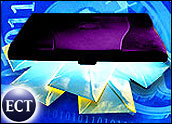
Security firm Sophos once again has named the U.S. as thebiggest spam-producing nation in the world in a recent report. Sophos alsohighlighted the growing problem of compromisedcomputers, or “zombies,” as conduits for theunwanted e-mail.
Sophos put the U.S. atop the latest “Dirty Dozen” list, crediting America with morethan 42 percent of all the world’s spam in 2004. Othertop offenders were South Korea (13 percent) and China (8.5 percent).
Sophos attributed the U.S.’s ranking to theprevalence of high-capacity broadband Internetconnections there. Small offices and home users with such connections are attractive targets that increasingly have been hijacked and put to work by spammers, often without users being aware,Sophos said.
“Many spammers have taken their money-makingschemes to the extreme by hacking into innocent,third-party computers in an effort to do their dirtywork,” said GrahamCluley, Sophos senior technology consultant, in a statement. “Many home users’ computers aresending out spam because they have had their broadbandconnections exploited by remote hackers.”
Spam Supplier
The most recent Sophos finding falls in line withprevious studies. The U.S.accounted for 42.53 percent of the world’s spam inAugust and for 56.74 percent in February 2004, Sophosreported.
Broadband connections — prevalent in South Korea as well as in the U.S. –are attractive to spammers looking to send mass e-mailwhile covering their tracks, according to Marc Borbas, Sophos product managerfor gateway security.
Borbas also told TechNewsWorld that it is easier to use a compromisedbroadband connection to send spam because the user ismuch less likely to notice the impact on PC performance.
Sophos also blamed ineffective anti-spam laws inthe U.S. Cluley said the Can-Spamlegislation of this year had done little to slow spam.
American Might
Jonathan Spira, chief analyst at Basex — a firm that blamedspam for US$20 billion in losses worldwide last year –said the increasing issue of zombie machines showedthat most people do not practice safe computing, such asusing firewalls and antivirus software.
Spira told TechNewsWorld the U.S. is responsiblefor the large percentage of spam mainly because it hasmore online users and commerce.
“It’s a question of access to computers, cheapcomputing resources and many societal reasons,” Spirasaid.
The analyst added that while enterprises can and dotake steps that are effective in blocking or at leastminimizing spam — mainly gateway filtering — smallbusinesses and home users often do not have theresources to do this.
In addition, while larger Internet serviceproviders (ISPs) have made anti-spam measures standardofferings for consumers, most smaller ISPs are in thesame position as consumers, according to Spira.
“Smaller ISPs can’t necessarily afford the latesttechnology,” he said. “They really need to do this andthey can’t.”





















































